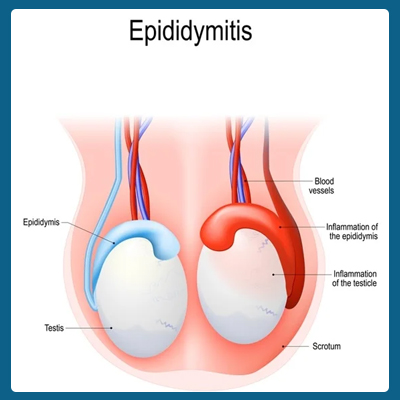

Epididymitis is an inflammation of the coiled tube (epididymis) at the back of the testicle that stores and carries sperm. Males of any age can get epididymitis.
Epididymitis is most often caused by a bacterial infection, including sexually transmitted infections (STIs), such as gonorrhea or chlamydia. Sometimes, a testicle also becomes inflamed — a condition called epididymo-orchitis.
Signs and symptoms of epididymitis might include:
Epididymitis that lasts longer than six weeks or that recurs is considered chronic. Symptoms of chronic epididymitis might come on gradually. Sometimes the cause of chronic epididymitis isn't identified.
Causes of epididymitis include:
Rhododendron is prepared from the fresh leaves of a plant named Rhododendron Chrysanthum or Yellow Snow-Rose. The natural order of this plant is Ericaceae. Rhododendron is a natural medicine for epididymitis when intense violent pain and tenderness in the testicle is present. The testicle is very sore and painful to touch, and the soreness extends to the thighs and abdomen. The scrotum is also swollen. The pain may be contusive or drawing in nature. For using Rhododendron, pain in the testicle worsens from sitting and gets better upon walking. Slight thin discharge from the urethra may also be present. Rhododendron is also indicated in cases where orchitis arises in addition to epididymitis, i.e., in cases of epididymo-orchitis.
Spongia Tosta is a homeopathic medicine for testicle pain in cases of epididymitis. The pain in the testicle may be bruised or pinching in nature. Sometimes stitching, shooting pain in the testicle is there. The shooting pain may radiate from the testes to the inguinal region. Touch tends to worsen the pain. Swelling in the scrotum along with a sensation of heat and burning is also present.
Apis Mellifica is a natural homeopathic remedy useful for swollen, red scrotum in cases of epididymitis. For using Apis Mellifica, the right side is more affected. The testicle pain is also there in addition to the red, swollen scrotum. Pain in testicle worsens when touched. Along with the above features, frequent desire to urinate is present. Burning and scalding in the urethra during and after urination is also prominently present.
Clematis is prepared from the leaves and stems of a plant named Clematis Erecta of the family Ranunculaceae. Clematis is beneficial for tender testicles in epididymitis. The testes are very painful to touch. Pinching pain is felt in the testicle from the slightest touch. Motion and walking also worsen the pain. Drawing pain in the inguinal region and thigh may be felt along with testicle pain. The scrotum may also be swollen.
Pulsatilla is prepared from the entire fresh plant named Pulsatilla Nigricans or Pasque Flower. This plant belongs to the natural order Ranunculaceae. Pulsatilla is indicated for epididymitis when discharge from the penis is present. The discharge is thick yellow or yellow-gr